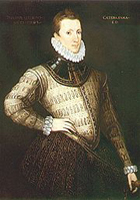Sir Philip Sidney Biography
Sir Philip Sidney was born at Penshurst Place, Kent, eldest son of Sir Henry Sidney. He entered Shrewsbury School in 1564 on the same day as Fulke Greville, his friend and biographer. After attending Christ Church, Oxford (1568-72), he travelled in Europe where for three years he perfected his knowledge of Latin, French and Italian. In 1577, aged twenty-two, he was sent as ambassador to the German Emperor and the Prince of Orange.
His strong Protestant sympathies made him advise Elizabeth I in a private letter (1579) against marrying the Duke of Anjou, Roman Catholic heir to the French throne. He was knighted in 1583 and became Member of Parliament for Kent in 1581 and 1584-85. In 1585 he was appointed joint master of the ordnance, the office in charge of the country's military supplies.
A patron of scholars, his wide range of interests accounted for the dedication to him of over forty works of various disciplines. The best-known poet to enjoy his patronage was Spenser who dedicated his Shepherd's Calendar to him. Avoiding commercialism, he did not publish his works in his lifetime. He was fighting against the Spaniards in the Netherlands when he received a wound which eventually killed him at the age of thirty-two. All England mourned this courtier and statesman who had embodied the Elizabethan ideal of virtue.
ASTROPHEL AND STELLA: I
Loving in truth, and fain in verse my love to show,
That she, dear she, might take some pleasure of my pain,--
Pleasure might cause her read, reading might make her know,
...
Leave me, O love which reachest but to dust,
And thou, my mind, aspire to higher things;
Grow rich in that which never taketh rust:
Whatever fades but fading pleasure brings.
...
My true-love hath my heart, and I have his,
By just exchange, one for the other giv'n.
I hold his dear, and mine he cannot miss;
There never was a better bargain driv'n.
...
MY true love hath my heart, and I have his,
By just exchange one for another given:
I hold his dear, and mine he cannot miss,
There never was a better bargain driven:
...
Come, Sleep! O Sleep, the certain knot of peace,
The baiting-place of wit, the balm of woe,
The poor man's wealth, the prisoner's release,
Th' indifferent judge between the high and low;
...
